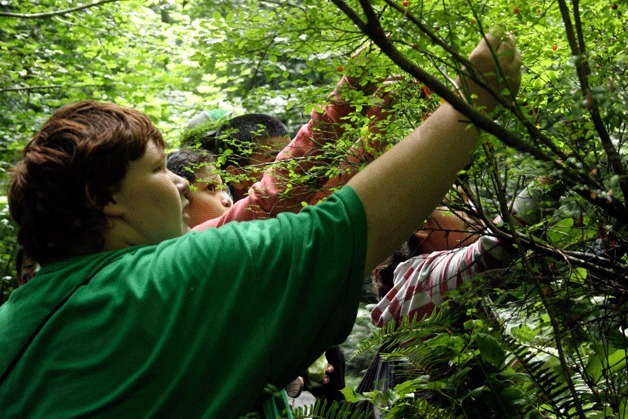For Washington migrant students, trees are not so much ecosystems as they are what gives their parents work in the apple orchards and cherry farms of Eastern Washington.
That is until they came to IslandWood last week for the “Voices from the Field” program.
“Even the ferry ride is exciting for them, because they’ve never been on the ferry before, or even seen the Puget Sound,” said Samantha Ruiz, the migration graduation specialist for the Wahluke School District in Mattawa.
The week-long program brought in 70 middle school students who come from migrant households almost all from the eastern side of the state.
Students coming from migrant family households have one or two parents who work in the agricultural industry. Also, it is not uncommon for them to pick up mid-school year as the family makes moves between districts for seasonal work.
“That’s really hard when you have an interrupted school year like that,” Ruiz said. “When you’re trying to transfer credits back and forth between schools, a lot of things can get messed up.
“These kids can fall between the cracks because, between larger schools or small schools, they sometimes go unnoticed.”
Victoria Diaz, an eighth-grader from Mattawa, lives with her parents and relatives. She says it’s hard because she doesn’t get to see her 19-year-old brother who, about four months ago, left for Wenatchee to drive a forklift at an apple packaging plant.
Her father works as a mechanic for Evans Fruit Company. Her mother just recently went back to work picking apples at King Fuji Ranch after a fall from her ladder left her to recover from a broken tailbone and a pinched nerve.
Victoria has moved just often enough to qualify her as a migrant student in Mattawa but not so much that she is going in and out every year. It’s the stress of a working family that makes a flexible education vital for migrant students.
So with this, the IslandWood education team, along with Helen Malagon, the State of Washington’s associate director in Migrant and Bilingual Education, and Ellen Ebert, the state’s science director, teamed up to create an opportunity for Washington migrant students to travel to Bainbridge Island.
“It’s not about understanding the value of IslandWood,” said Martin LeBlanc of IslandWood. “It’s highlighting that you have a population of migrant families and migrant workers in the state who give so much to our state’s economy.
“I mean they are invaluable, but they are under an incredible amount of stress for the amount of work that they’re doing and the amount that they are having to move around their families.”
The program “Voices from the Field” is in its second year at IslandWood.
The goal is to help build confidence in these students, many of whom have never seen deer n or woodpeckers before, let alone traveled to Western Washington’s notable forests and beaches.
Students split off into small groups of seven or eight for the week and were led by an IslandWood instructor on outdoor education.
Each day the groups worked on an investigation.
For example, one project studied how much tree cover affects the amount of rain that reaches the ground. The students used rain gauges and placed them in different areas around the tree to compare.
Another study had the students divide the beach into sections to find how many crabs live in an area based on the distance from the water.
It gives a whole new image to the outdoors for these students, and, IslandWood hopes, sheds light on the scientific aspects of the fields their parents work in.
Over the week at IslandWood, students could be found hiding in the woods playing a game called “camouflage,” identifying plants, pointing out even the smallest of birds hopping from limb to limb in the forest, or learning the difference between sapsuckers and woodpeckers from the marks they leave behind on tree trunks.
“We don’t want them to just go back into the fields when they’ve graduated,” Ruiz said.
“And that’s why we bring them to IslandWood, we want them to see what else is out there and experience new things.”



